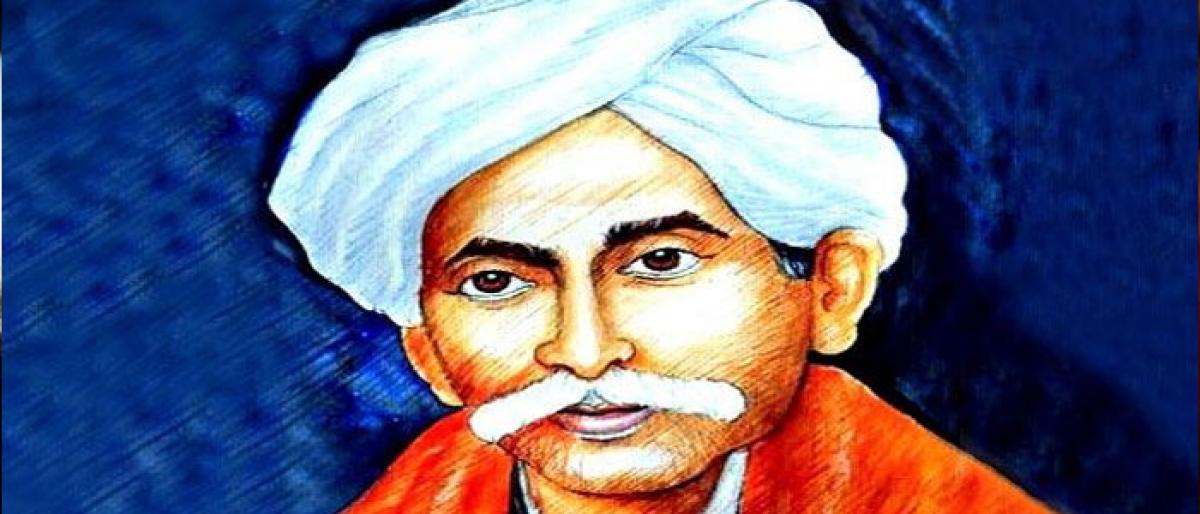A peoples prosody

Gathering pearls, from the ocean of time, Gurajada Apparao, strung them to suit the times of the vox populi, which needed a simple expression of robust experiences of life, and a stupendous optimism about the future centuries In the year 1910, Gurajada, nearing fifties,
Gathering pearls, from the ocean of time, Gurajada Apparao, strung them to suit the times of the vox populi, which needed a simple expression of robust experiences of life, and a stupendous optimism about the future centuries. In the year 1910, Gurajada, nearing fifties, returned from an all caste-feast at Berhampur, the Haley Comet spectacular, accompanying him in the sky, and reeled out to his half-asleep wife, the events in the social space, and as well as the spatial scale. Thus, born was his string of pearls – in Telugu, Mutyala Saramu, a prosody of the modern times full of scientific temper and social consciousness.
The year 1910 is also significant for his few poems in this prosodic pattern started to appear in the periodicals. From July to August, three poems Mutyala Saramu, Kasulu, Damon and Pythias, and in the month of November, the same year Lavana Raju Kala, (The dream of Lavana Raju) were printed in Andhra Bharathi, edited by Ayyanki Venkata Ramanayya, published from Machilipatnam.
In arranging Mutyala Saramu, Gurajada had drawn from the Matra and Desi Chandhassu (Prosodic styles of Harina Jaathi and Vrishabha Jaathi Ragadas, common in Kannada and Telugu), and from the folk songs of women like Gummadede Gopi Devee (Where is the kid o, Gopi Devi?). Though the prosodic pattern coming closer to this is styled as Vrushabha Ragada was used sparingly by different medieval era poets, Ramaraja Bhushana, Nandi Timmana, and Gopnathamu Venkata Kavi, in Vasu Charitra, Parijathapaharanamu, Gopinatha Ramayanamu, and works by other poets, Chandrika Parinayamu, Talaka Nandinee Parinayamu, etc.
No poet named them as Mutyala Saramu. Making his style of 14 matras (Matra can be called as syllable that can be pronounced in one effort) of three lines and the fourth and last one to range between 9 and 14 matras, Gurajada, also stated that while fixing the matra requirements of this prosody, he had in mind even one Parsi Ghajal pattern also.
In such steady blend of the old and new, the bard made his style and in the first verse, he wrote in this fashion said– “Shall I knit the pearl strings gathering the lucid words, with the blend of the old and new shining anew”. True to the stanza, his efforts to define this style, from the old and new, augured well, to suit the modern times.
Gurajada in all his handful of lyrical stories produced more than three hundred verses of Mutyala Saramu, and the output is entirely secular and reflects the social and philosophical mindset of the poet, who aspires to the emergence of model societies based on egalitarian outlook and social space for all. No single verse of this prosody was written in praise of the almighty or lost in the charming wilderness of waxing eloquent about the female body.
No earlier poet in the last millennium ranging from Nannaya, considered to be the first Telugu poet called any prosodic style, to be his own making. Many poets, in the flow of centuries, have written their works in the prosodic styles existing. Thus, the place of Gurajada is distinct and unique, since he is the only one poet, who defined a simple metre and produced artistic works in that style and the major poets who followed him in time, also have produced their famous works in this prosodic style.
Truly termed to be Abhyudaya Chandhasssu, (progressive prosody) this Mutyala Saramu, is simple and as of right adherents and followers of the legacy of Gurajada, by this time, measures to popularise and propagate, the simple and effective style of writing Mutyala Saramu, should have been tried among the younger generations. After all writing four-line stanza of prescribed verse will be a matter of interest and challenge to the young minds as well. Such implementation will attract the attention of literati to write, and draws ordinary folks, to sing and perform to the appealing lines.
Planning a great connection to the simple style of writing, through Mutyala Saramu, now it will be an important step to inspire the society, young minds, and also to conserve and develop the democratic tradition ushered in by the great bard Gurajada. Hence it is our earnest priority to promote the Mutyala Saramu as the peoples’ prosody, which looks beyond any barriers, to make the whole world, a home, the quality policy pronounced by Gurajada about hundred and eight years ago.
















